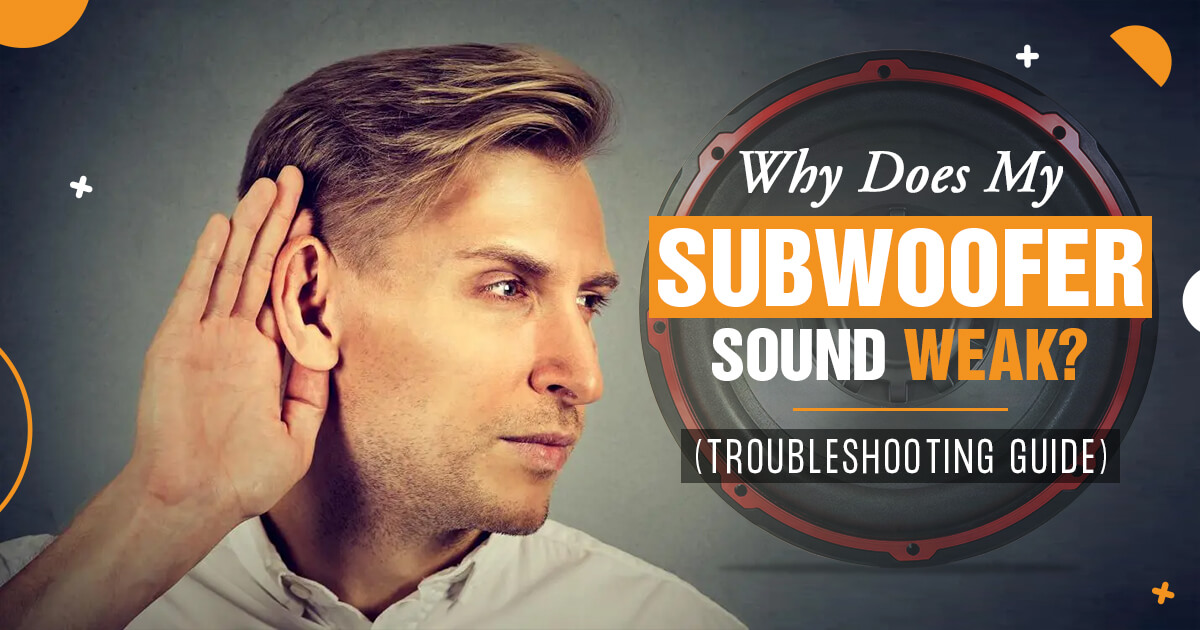Subwoofers play a vital role in the general sound chain. Whether you like keeping your sound low or cranking things up, it is crucial to have a subwoofer that works properly. Regardless of the song you play, your sound will not be complete without a subwoofer.
These sound components are designed to enhance the quality of your sound. Like other technology, a subwoofer can break down and sound weak. As such, it can be somewhat frustrating when your subwoofer begins to sound weak.
However, when your subwoofer starts to sound weak, you just don’t toss it into the garbage and buy a new one. When the sound quality of your subwoofer drops, you need to take out time to troubleshoot the problem.
Your subwoofer might not be bad simply because it sounds weak. Many things can be responsible for the question, why does my subwoofer sound weak. This guide will walk you through some of the possible causes of your subwoofer’s low volume problem.
Reasons Why Your Subwoofer Sounds Weak

There is a wide range of reasons why your subwoofer can be sounding weak. When you know the problem, you can resolve it with ease. Here are some of the reasons why your subwoofer is sounding weak:
- Low-Frequency Output
Many sound newbies expect to hear sounds from the subwoofer at all times. The subwoofer is designed to reproduce only bass frequencies from bass drums, bass guitar, blasts in movies, and more. If there is no low frequency in the sound source, your subwoofer will sound weak or remain silent.
Hence, once you notice that your subwoofer sounds weak, you should check your sound source. Ensure that the sound input contains low-frequency sounds such as heavy bass or rumbles. If the sound source has low-frequency sounds, you can continue with the following troubleshooting options.
- Sound System Settings
Your subwoofer might also sound weaker if the setting of your sound system does not favour it. Hence, you should check the settings of your system when your subwoofer starts producing weaker sounds.
Ensure your main speakers’ frequency settings are synchronized with your subwoofer’s settings to prevent a clash in frequency levels. If the frequency levels are clashing, it might result in weak or distorted sound. You should also check the bass knob, subwoofer volume knob, and the volume levels of other components like the head unit.
If an amplifier powers your subwoofer, check the amplifier’s settings to make sure they are favourable to the subwoofer. If the receiver has issues or the settings are not correct, the sound quality of your subwoofer might be weak as well. All the sound system components should synchronize together to prevent weaker or distorted sound.
- Weak Sound Sources
If the configuration of your sound sources is poor, your subwoofer might reproduce weak sound. For instance, if you use the subwoofer in a studio, the configuration of the sound source might be weak.
In that case, you need to check your sound sources, such as mic and other programs in your configuration. Make sure they are well connected and functioning optimally as well.
To be sure they are not the cause, connect another source to your subwoofer, such as your phone. If the subwoofer sounds good, you need to troubleshoot the sources in your audio configuration.
Also Read: What Causes Subwoofer Pulsing With No Sound
- Underpowered Subwoofers
Sound equipment uses electrical power, and you need to power them correctly if you want them to function well.
If your subwoofer does not have a sufficient power supply, it might not be able to produce sound to its full capacity. This would make it produce weaker sounds than it ought to.
To prevent under-powering your subwoofer, do not connect it to a strained amplifier. Worn-out amplifiers can also make your sub produce weak or distorted sound. Therefore, you need to check the power level of your connections and ensure it is appropriate.
If you discover that you are underpowering your subwoofer, you should disconnect the speakers immediately. Underpowering your subwoofers will make them sound weaker and reduce their lifespan. You can only experience the sub’s maximum capacity when it has enough power.
- Motor Problems
The motor of a subwoofer is one of the primary reasons it could sound weaker. If any of the above is not the reason for the poor sound quality, you should check the motor to see if it runs appropriately.
An unstable power or faulty fuse might damage the motor of the subwoofer. If the motor suffers any damage, it will affect the quality of sound the subwoofer produces. As such, you should check the motor or outsource it to a professional for repairs.
- Inappropriate Amplifier Size
Sometimes, your subwoofer might be producing high-quality sound when it is at a low volume. However, when you increase the volume, the sound becomes weak. If that is the case, chances are your amplifier is smaller than your system. To restore the subwoofer to its maximum capacity, you should replace the amplifier with a larger one.
If you have a large audio system, you should consider using more than one amplifier. For optimal performance, you should use one amplifier channel for one subwoofer.
Also Read: Easiest Way To Measure For A Subwoofer
- Acoustics
Do you know that room acoustics affect the speaker sets or sound system in that room? If your sub is sounding weak, chances are the fault might not be from the equipment itself but the room.
The acoustics of a room are of primary importance to the audio-video system in that room. If the acoustics of a room does not support the sound system, you might not enjoy the sound quality of your subwoofer.
Every sound engineer considers the acoustics of a room during a setup, as poor acoustics affect their structure.
Even the best subwoofers cannot give you your desired results when the room acoustic is poor. So, ensure the room has an excellent acoustic to prevent that soft sound from your subwoofer.
- Improper Connection
Another reason why your sub is sounding weak is an improper connection. Check the link from the sound source to the mixer (if in use) to the amplifier and down to the subwoofer. Improper connection can result in weak sound, so you should run proper diagnoses for all your connections to ensure they are in place.
You can also disconnect and reconnect the system to know what could be causing the issue. Other connections to check to include the wiring close to the central unit, the cables used for the connection, and the battery or the fuse.
Check the wires to ensure they are not broken, corroded, or burnt. If any wire has an issue, replace it and rerun the check. Poor or low-quality cables can also cause your subwoofer to produce weak sound. An overworked amplifier sends lower frequency or affects the incoming signal, so you should avoid using it.
Also Read: Is A Sub Cable The Same As RCA Cable
- Reduced Bass Levels
If the bass volume of your sub is not adjusted correctly, you might experience a weaker sound from it. Check if the bass level of your woofer is reduced on your control system or mixer and increase it to your desired level.
Some sound systems come with a separate button on the remote to control the woofer volume. It allows you to modify the bass sound of the audio system.
- Improper Polarization
The polarity of a sound system’s setup also plays a crucial role in its functions. If your woofer is not sounding properly, chances are you mis-polarized it. Mis-polarization could reduce the sound pressure level of our subwoofer, making it sound weaker. Therefore, you should check the polarity of your woofer to make sure it is not producing an insufficient sound pressure level.
Ways to Enhance the Sound Quality of Your Subwoofer

If your woofer is not functioning at its maximum capacity, there are several ways you can boost the sound. Here are a few tips for improving the sound quality of your subwoofer.
- Change the Woofer’s Spider
Changing the spider of the woofer can enhance its sound significantly. Many people do not know what a spider is but are familiar with the tweeter in full or mid-range speakers. A spider is a tiny cone in front of a sub. You can revamp the sound of your woofer by replacing the type of spider on it.
- Add Filters to the Woofer
Most times, woofers come with built-in electrical filters. The resonance filter in the amplifier and these electrical filters enhance your woofer’s quality at low volumes. Hence, adding a filter to your sub would help to boost its sound quality. You can use paper-sized foil as a filter for the woofer.
- Ensure the Subwoofer Is Enclosed Properly
To achieve a better and deeper bass tone, you need to make sure the woofer is adequately enclosed. The woofer should be in a sealed and tight box. If you are enclosing it yourself, make sure you follow the manufacturer’s recommendation and instructions.
Also Read: Can You Put A Sub In A Cabinet
- Sufficient Power from an Amplifier
A woofer requires a lot of power to produce low frequencies. Hence, if you want the subwoofer to perform at its best, you need to supply it with much power. An underpowered subwoofer can produce distorted sound.
Excessive distortion does reduce not only the sound quality of the woofer but also damages its coil. To prevent damage to your coil and enhance your bass quality, you should use a very powerful amplifier.
A powerful amplifier will deliver strong sound and more profound and amplified bass with improved quality. An amplifier will enhance the sound signals entering your woofer without straining it. Nevertheless, you should avoid overpowering the woofer, as it could fry the coil.
- Tune the Sub Properly
Tuning also has a role to play in the performance of your subwoofer. To make the subwoofer perform at its best, you need to tune it properly. Tuning it would help flatten the bass response and reduce distortion.
Subwoofer Not as Loud as It Used to Be:
There could be a number of reasons why your subwoofer is not as loud as it used to be. One possibility is that the speakers themselves may be worn out and need to be replaced. Another possibility is that the amplifier driving the subwoofer may be weak, and need to be replaced or upgraded.
Car Subwoofer Low Volume Problem: How To Fix?
There can be a few reasons why you might be experiencing car subwoofer low volume problem. One reason might be that the subwoofer is not getting enough power. This can be caused by a number of things, including a blown fuse, a bad amplifier, or a wiring problem.
Another possibility is that the speaker itself is damaged and needs to be replaced. Finally, there may be something wrong with the way the subwoofer is positioned in your vehicle.
How to Make Subwoofer Louder?
There are a few ways to make your subwoofer louder but why does my subwoofer sound weak? One way is to simply turn it up. However, this can create distortion and may not be desirable. Another way is to use an electronic amplifier to increase the power to the speaker.
This will give you more volume while still keeping distortion low. If you have a subwoofer with an adjustable frequency response, you can also adjust the settings to increase the bass output.
Why is my subwoofer so quiet?
Are you having trouble getting your subwoofer to produce the booming bass sound that you want? It can be extremely frustrating trying to figure out why your subwoofer is so quiet.
Many people experience this issue, however, there are some common reasons why this problem may occur.
The first potential cause of a quiet subwoofer is an incorrect volume setting on the amplifier or receiver. In order to get the most out of your subwoofer, it is important to set the volume levels correctly and ensure that all components are properly connected.
If everything appears to be in order but your subwoofer is still too quiet, then it may be time for a closer inspection.
Another possible reason behind a quiet subwoofer could be physical damage or aging parts inside of the speaker itself.
Also Read: How To Fix Subwoofer Distortion
Frequently Asked Questions:
How Do You Fix A Low Subwoofer Sound?
You can fix a low woofer sound by adjusting the woofer’s volume or other settings. Removing the system from night mode might also help.
Sometimes, increasing the system’s volume might not increase the subwoofer’s volume (depending on the audio system). You would have to look for the subwoofer bass volume on the remote and increase it in such cases.
How Can I Make My Bass Subwoofer Louder?
Some common ways of making a bass subwoofer sound louder and better are adding a phase Shifter or filter to the woofer.
Changing the spider (the small cone in front of the sub) can boost the woofer’s performance. Another notable way of making your bass subwoofer sound louder is using a suitable amplifier. Provide the sub with enough power but avoid overpowering it.
Why Is My Sub Vibrating?
Subwoofers vibrate because of the low frequencies they reproduce. However, if you notice any abnormal vibration, it might be a sign of overpowering or under power. It can also signify that the subwoofer parts are not tight enough. Providing the right amount of power and tightening the unit will help to enhance the sound quality.
Also Read: How To Reduce Sub Vibration Through Walls
Final Thoughts
Subwoofers are an essential part of every sound system. They add a unique tone and feel to the sound, making every song more enjoyable. As such, your subwoofer must perform at its optimal capacity at all times.
Your supposedly bad subwoofer might also be a result of a bad crossover setting, bad voice coil, clipped signal, bad speaker wires, tone controls, nasty standing wave issues, and more. If you can detect why your subwoofer sounds weak and cannot resolve the issue, you should consult a professional.
You can troubleshoot your subwoofer and audio system with the tips provided in this guide. However, if you cannot detect the issue, you should have a professional check it out.

